外研版(2019)必修 第二册 必修 第二册 Unit 1 Food for thought Developing ideas课件(共40张PPT,内镶嵌视频)
文档属性
| 名称 | 外研版(2019)必修 第二册 必修 第二册 Unit 1 Food for thought Developing ideas课件(共40张PPT,内镶嵌视频) | 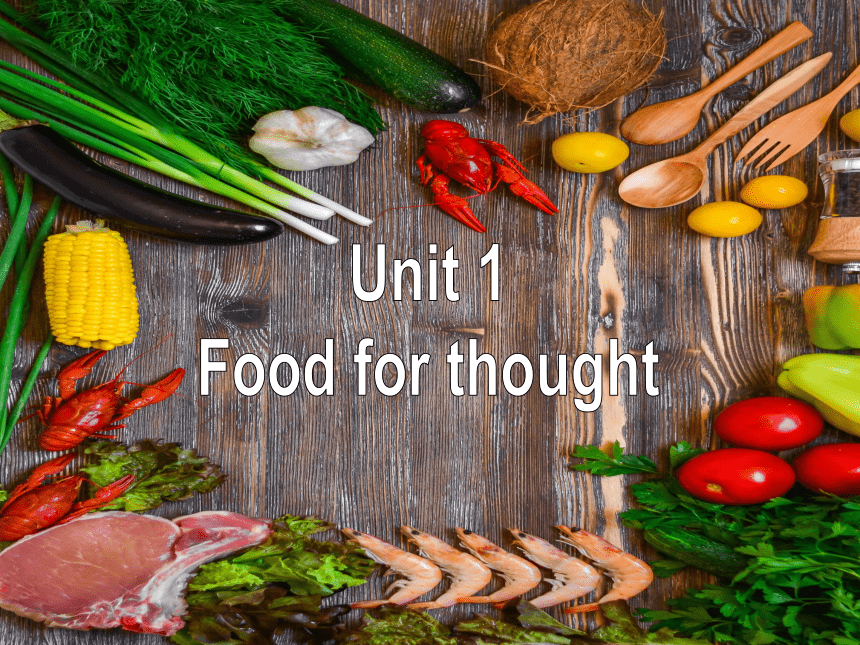 | |
| 格式 | pptx | ||
| 文件大小 | 20.2MB | ||
| 资源类型 | 教案 | ||
| 版本资源 | 外研版(2019) | ||
| 科目 | 英语 | ||
| 更新时间 | 2024-11-04 20:16:44 | ||
图片预览








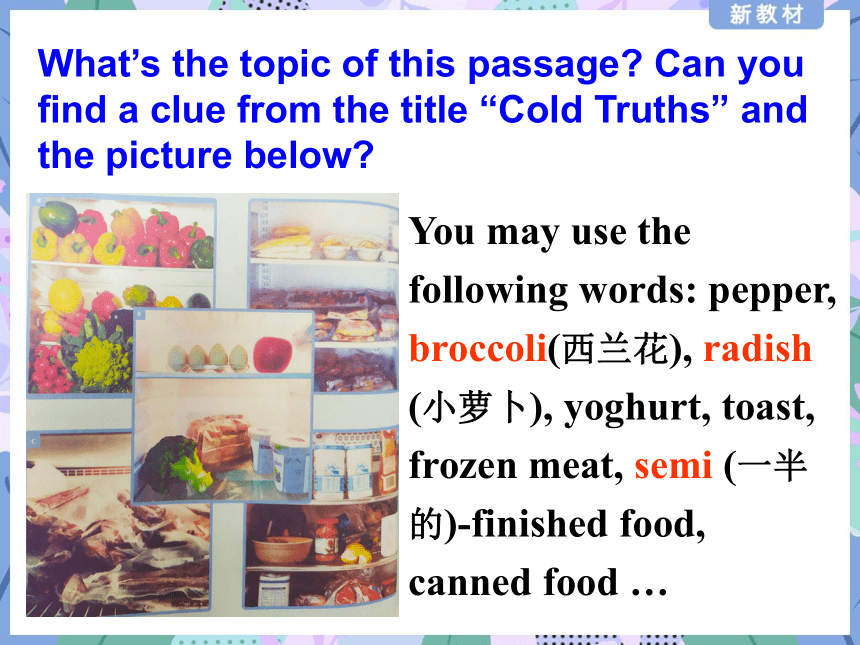
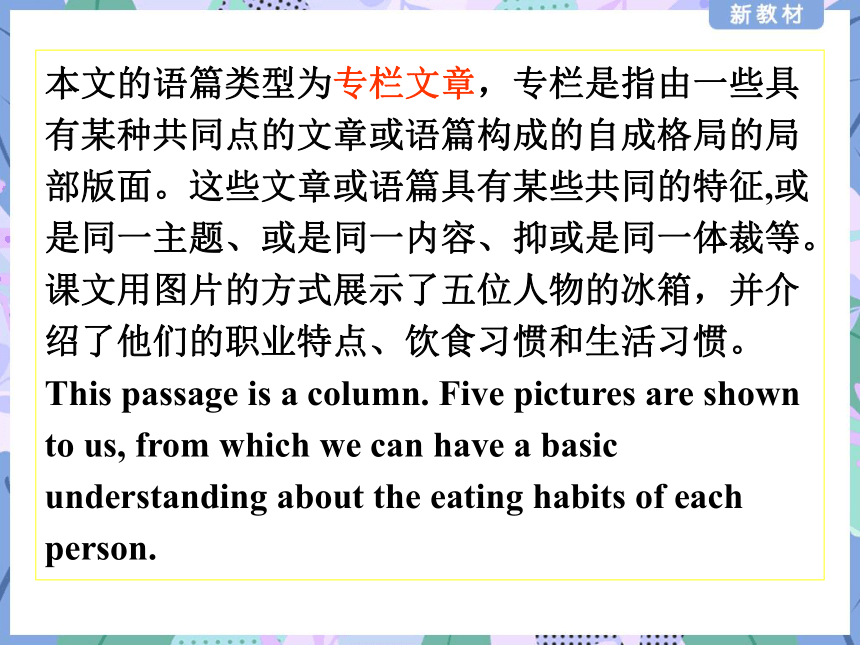
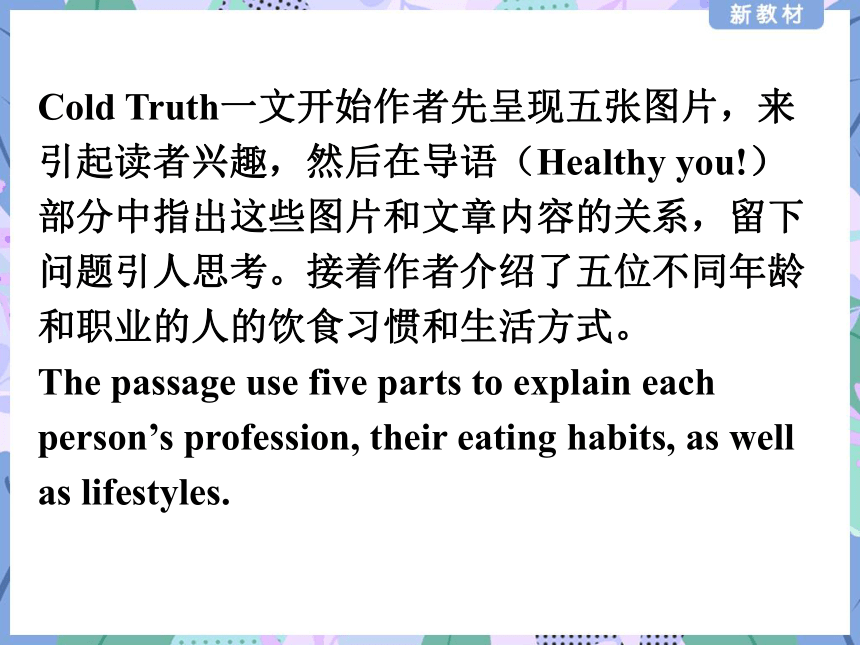
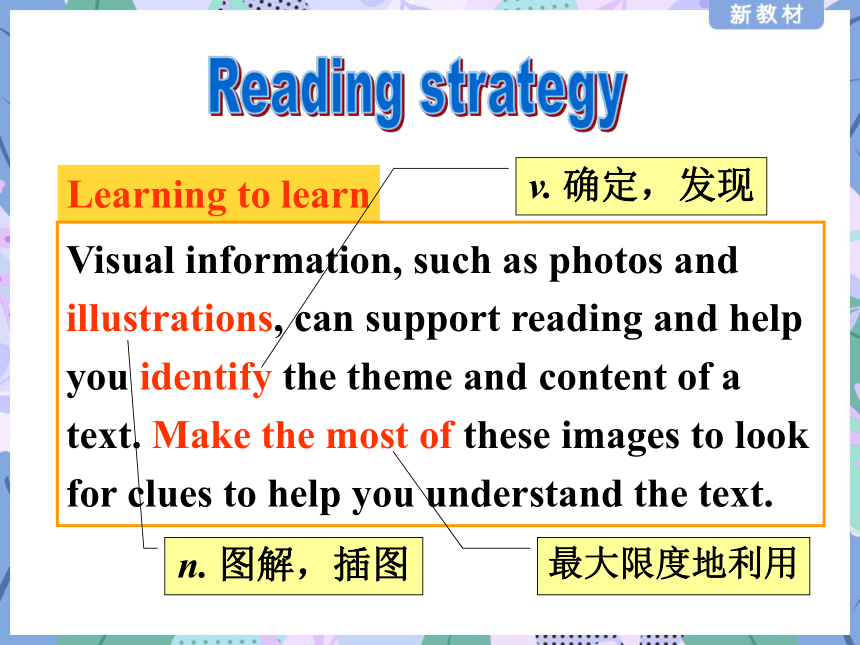
文档简介
(共40张PPT)
Unit 1
Food for thought
To understand the passage and evaluate their lifestyles
To learn to give some suggestions on different lifestyles after evaluation
To learn to understand the connection between eating habits and healthy lifestyles
Read carefully.
Do you think the “Healthy Eating Pyramid” reasonable Why
How to eat healthily
You may use the following words: vitamin, nutrition, low-fat, low-salt, low-calorie, low free sugar, high-protein, dietary fibre …
Morning time is tight. Do you think it is necessary to save some time for a rich breakfast
Work in pairs. Talk about what you usually eat for dinner and decide who eats more healthily.
porridge
steamed stuffed bun
pancake
noodles
a big meal
dough drop vegetable soup
You may use the following words: pepper, broccoli(西兰花), radish (小萝卜), yoghurt, toast, frozen meat, semi (一半的)-finished food, canned food …
What’s the topic of this passage Can you find a clue from the title “Cold Truths” and the picture below
本文的语篇类型为专栏文章,专栏是指由一些具有某种共同点的文章或语篇构成的自成格局的局部版面。这些文章或语篇具有某些共同的特征,或是同一主题、或是同一内容、抑或是同一体裁等。
课文用图片的方式展示了五位人物的冰箱,并介绍了他们的职业特点、饮食习惯和生活习惯。
This passage is a column. Five pictures are shown to us, from which we can have a basic understanding about the eating habits of each person.
Cold Truth一文开始作者先呈现五张图片,来引起读者兴趣,然后在导语(Healthy you!)部分中指出这些图片和文章内容的关系,留下问题引人思考。接着作者介绍了五位不同年龄和职业的人的饮食习惯和生活方式。
The passage use five parts to explain each person’s profession, their eating habits, as well as lifestyles.
Reading strategy
Learning to learn
Visual information, such as photos and illustrations, can support reading and help you identify the theme and content of a text. Make the most of these images to look for clues to help you understand the text.
n. 图解,插图
最大限度地利用
v. 确定,发现
Read the passage and match the pictures of the fridges to their owners.
Tips:
Scan the passage quickly, and then match the pictures with the given information.
a-Jenny b-Mike c-Ted
d-Max e-Ellie
Which words or sentences can help you figure out the answers
Ellie
half empty fridge
eat quick food, like toast, yoghurt
Jenny
don’t eat meat; dairy free
make meals from fresh, seasonal fruit and vegetables
Ted
big meat eater
like homemade sausages
Mike
bring food from the restaurant
buy a lot of frozen food
Max
shared house with others
don’t buy fresh food
Which words or sentences can help you figure out the answers
Find out who might say the sentences below.
“There is a lot of food from my workplace in our fridge.”
“You might find bean products in our fridge, but hamburgers Never!”
“My fridge is a total mess! All I do is party and hit the books.”
做学校的功课,学习
d-Mike
b-Jenny
e-Max
4. “There isn’t really much in my fridge. I’m just too busy and tired to cook at home!”
5. “If you’re someone who avoids animal products, you wouldn’t find anything to eat in my fridge!”
a-Ellie
c-Ted
What do you think the saying “You are what you eat” means
“You are what you eat” means the food that you eat affects your health, your energy level, your mood, and even your behaviour. Therefore, in order to be fit and healthy, you need to eat fresh and healthy food.
2. Do you know of any Chinese sayings about food and health What is your understanding of them
One possible answer:
“病从口入” A closed mouth catches no flies. It suggests that we should be careful about what we eat to keep away from diseases.
3. Which person’s eating habits are most similar to yours
4. What can you do to improve your eating habits from now on
First of all, keep a balanced (均衡的) diet. Next, stay away from junk food.
What’s more, have regular meals.
Work in groups. Make comments and suggestions about the lifestyle of each person in the passage.
1. Discuss the lifestyle of each person. Use the table to make notes.
Name Lifestyle
Ellie
Jenny
Ted
Mike
Max
One possible answer:
No time or energy to cook. Have quick, light dinners.
Vegetarian; cook a lot at home with fresh, seasonal fruit or vegetables.
Meat-lover; often eat big meat dinners; love sausages.
So busy that often bring food from the restaurant or buy frozen food.
No fresh food to eat; no time to eat regularly.
2. Organise your ideas following the steps below.
Describe the lifestyle of each person in the passage.
Explain the possible problems with their lifestyles.
Make suggestions about how they can improve their lifestyles.
3. Share your ideas with the class.
Cold Truths
课文标题语带双关,“Cold Truths”原意是“冰冷的事实”,结合课文内容,可将标题理解为冰箱里冷冰冰的食物所反映出的真实生活方式。进一步拓展思维,也可以认为课文中展示的不良饮食习惯和生活方式终将影响人们的身体健康,这也是一个残酷的事实。因此这篇课文的意义在于呼吁人们形成良好的饮食和生活习惯。
本单元的标题“food for thought”也是双关语。food for thought是一个习语,本意指的是 “something that should be thought about or considered carefully”,意指“需要认真考虑的事情”。恰好,本单元主题是多元饮食文化和健康的饮食习惯,谈到了食物“food”,一语双关,意指我们应该认真对待自己摄入的食物。
2. Can you guess which fridge belongs to which person
belong to sb.: to be owned by sb.
belong to sth.: to be a member of sth. or to be a part of sth.
【注意】
belong to是不及物动词短语,无进行时态,无被动语态。
【语境应用】改错。
1. The car isn’t belonged to him.
2. Does the book on the desk belong to yours
3. I’m very glad that the bike is belonging to me.
doesn’t belong
you
belongs
3. There’s not enough room to swing a cat in my small apartment, so I don’t cook very often.
Paraphrase: My apartment is too small to leave enough room for me to cook, so I don’t cook very often.
not enough room to swing a cat: (地方或空间)小的无法转身
4. I often end up saving part of my meal for the next day.
end up: to find yourself in a place or situation that you did not intend or expect to be in 最终成为,最后处于
end up + doing sth. / adj.
eg I ended up doing all the work myself.
If he carries on driving like that, he’ll
end up dead.
【拓展】
end in: to have sth. as a result 以……为结果;以……结尾
eg The word I’m thinking of ends in ‘-ous’.
我想到的这个词是以ous结尾的。
【语境应用】用end in和end up翻译句子。
他们的长期努力以失败而告终。
如果你继续这样,早晚得进监狱。
Their long struggle ended in failure.
If you go on like this you’ll end up in prison.
5. Cooking together gives us a chance to relax and catch up on each other’s days.
catch up (on): to spend time finding out what has been happening while you have been away or during the time you have not seen someone 事后得到关于……的消息
eg Come over tomorrow and we can catch
up.
【拓展】
catch up on: 补做,赶做
catch up in: 沉湎于,卷入
catch up with: 赶上,追上;最终查到
eg I have a lot of work to catch up on.
Innocent (无辜的) passers-by were caught up in the riots (暴乱).
After missing a term through illness he had to work hard to catch up with the others.
6. When I get back home, there’s nothing more satisfying than a big meat dinner.
Paraphrase: When I get back home, a big meat dinner is the thing that I like best.
本句中表否定的单词与形容词比较级连用,表达最高级的含义。
eg There is no better choice than this one
at the moment.
眼下没有比这更好的选择了。
否定词与比较级连用还可以表示肯定的意思, 常见结构如下:
can’t/couldn’t +比较级,再……不为过
I can’t agree with you more. 我再同意你的意见不过了。(我完全同意你的意见。)
He couldn’t have done better.
no, never, nothing+比较级
This could give her no greater pleasure.
这使她再高兴不过了。(这使她非常高兴。)
satisfying adj. 令人满意的 (修饰物)
【拓展】
satisfy v. (使)满足,满意
satisfy sb. with sth. 使某人对......满足
satisfied adj. 感到满意的 (修饰人)
sb. be satisfied with sth 某人对某物满足
eg The salad satisfies my appetite. I’m satisfied with it. I know your taste a lot. So the dish must be a satisfying meal for you too.
7. I guess I’ve always been a big meat eater and in this house, no family meal is complete without some form of meat.
Paraphrase: I love eating lots of meat and in my family all meals are always served with some kind of meat.
英语中存在用名词表达动词含义的现象,本句中用I’ve always been a big meat eater … 表达 I love eating lots of meat…的含义。
8. I still don’t think that anything can beat my
mum’s homemade sausages, though.
本句话的语序本应是:I still think that anything can not beat …。在这里使用了否定前置。当主语是第一人称且动词是表示心理活动的词,如think,expect,hope,believe等,要将后面从句中的否定词提前,构成否定前置。汉语翻译时,否定词要放回原来的位置。
eg I don’t believe he can solve it. =I believe he
cannot solve it.
After learning this unit, you must have some basic knowledge about healthy eating. Write down you own eating habits, recheck them and improve them if necessary.
Unit 1
Food for thought
To understand the passage and evaluate their lifestyles
To learn to give some suggestions on different lifestyles after evaluation
To learn to understand the connection between eating habits and healthy lifestyles
Read carefully.
Do you think the “Healthy Eating Pyramid” reasonable Why
How to eat healthily
You may use the following words: vitamin, nutrition, low-fat, low-salt, low-calorie, low free sugar, high-protein, dietary fibre …
Morning time is tight. Do you think it is necessary to save some time for a rich breakfast
Work in pairs. Talk about what you usually eat for dinner and decide who eats more healthily.
porridge
steamed stuffed bun
pancake
noodles
a big meal
dough drop vegetable soup
You may use the following words: pepper, broccoli(西兰花), radish (小萝卜), yoghurt, toast, frozen meat, semi (一半的)-finished food, canned food …
What’s the topic of this passage Can you find a clue from the title “Cold Truths” and the picture below
本文的语篇类型为专栏文章,专栏是指由一些具有某种共同点的文章或语篇构成的自成格局的局部版面。这些文章或语篇具有某些共同的特征,或是同一主题、或是同一内容、抑或是同一体裁等。
课文用图片的方式展示了五位人物的冰箱,并介绍了他们的职业特点、饮食习惯和生活习惯。
This passage is a column. Five pictures are shown to us, from which we can have a basic understanding about the eating habits of each person.
Cold Truth一文开始作者先呈现五张图片,来引起读者兴趣,然后在导语(Healthy you!)部分中指出这些图片和文章内容的关系,留下问题引人思考。接着作者介绍了五位不同年龄和职业的人的饮食习惯和生活方式。
The passage use five parts to explain each person’s profession, their eating habits, as well as lifestyles.
Reading strategy
Learning to learn
Visual information, such as photos and illustrations, can support reading and help you identify the theme and content of a text. Make the most of these images to look for clues to help you understand the text.
n. 图解,插图
最大限度地利用
v. 确定,发现
Read the passage and match the pictures of the fridges to their owners.
Tips:
Scan the passage quickly, and then match the pictures with the given information.
a-Jenny b-Mike c-Ted
d-Max e-Ellie
Which words or sentences can help you figure out the answers
Ellie
half empty fridge
eat quick food, like toast, yoghurt
Jenny
don’t eat meat; dairy free
make meals from fresh, seasonal fruit and vegetables
Ted
big meat eater
like homemade sausages
Mike
bring food from the restaurant
buy a lot of frozen food
Max
shared house with others
don’t buy fresh food
Which words or sentences can help you figure out the answers
Find out who might say the sentences below.
“There is a lot of food from my workplace in our fridge.”
“You might find bean products in our fridge, but hamburgers Never!”
“My fridge is a total mess! All I do is party and hit the books.”
做学校的功课,学习
d-Mike
b-Jenny
e-Max
4. “There isn’t really much in my fridge. I’m just too busy and tired to cook at home!”
5. “If you’re someone who avoids animal products, you wouldn’t find anything to eat in my fridge!”
a-Ellie
c-Ted
What do you think the saying “You are what you eat” means
“You are what you eat” means the food that you eat affects your health, your energy level, your mood, and even your behaviour. Therefore, in order to be fit and healthy, you need to eat fresh and healthy food.
2. Do you know of any Chinese sayings about food and health What is your understanding of them
One possible answer:
“病从口入” A closed mouth catches no flies. It suggests that we should be careful about what we eat to keep away from diseases.
3. Which person’s eating habits are most similar to yours
4. What can you do to improve your eating habits from now on
First of all, keep a balanced (均衡的) diet. Next, stay away from junk food.
What’s more, have regular meals.
Work in groups. Make comments and suggestions about the lifestyle of each person in the passage.
1. Discuss the lifestyle of each person. Use the table to make notes.
Name Lifestyle
Ellie
Jenny
Ted
Mike
Max
One possible answer:
No time or energy to cook. Have quick, light dinners.
Vegetarian; cook a lot at home with fresh, seasonal fruit or vegetables.
Meat-lover; often eat big meat dinners; love sausages.
So busy that often bring food from the restaurant or buy frozen food.
No fresh food to eat; no time to eat regularly.
2. Organise your ideas following the steps below.
Describe the lifestyle of each person in the passage.
Explain the possible problems with their lifestyles.
Make suggestions about how they can improve their lifestyles.
3. Share your ideas with the class.
Cold Truths
课文标题语带双关,“Cold Truths”原意是“冰冷的事实”,结合课文内容,可将标题理解为冰箱里冷冰冰的食物所反映出的真实生活方式。进一步拓展思维,也可以认为课文中展示的不良饮食习惯和生活方式终将影响人们的身体健康,这也是一个残酷的事实。因此这篇课文的意义在于呼吁人们形成良好的饮食和生活习惯。
本单元的标题“food for thought”也是双关语。food for thought是一个习语,本意指的是 “something that should be thought about or considered carefully”,意指“需要认真考虑的事情”。恰好,本单元主题是多元饮食文化和健康的饮食习惯,谈到了食物“food”,一语双关,意指我们应该认真对待自己摄入的食物。
2. Can you guess which fridge belongs to which person
belong to sb.: to be owned by sb.
belong to sth.: to be a member of sth. or to be a part of sth.
【注意】
belong to是不及物动词短语,无进行时态,无被动语态。
【语境应用】改错。
1. The car isn’t belonged to him.
2. Does the book on the desk belong to yours
3. I’m very glad that the bike is belonging to me.
doesn’t belong
you
belongs
3. There’s not enough room to swing a cat in my small apartment, so I don’t cook very often.
Paraphrase: My apartment is too small to leave enough room for me to cook, so I don’t cook very often.
not enough room to swing a cat: (地方或空间)小的无法转身
4. I often end up saving part of my meal for the next day.
end up: to find yourself in a place or situation that you did not intend or expect to be in 最终成为,最后处于
end up + doing sth. / adj.
eg I ended up doing all the work myself.
If he carries on driving like that, he’ll
end up dead.
【拓展】
end in: to have sth. as a result 以……为结果;以……结尾
eg The word I’m thinking of ends in ‘-ous’.
我想到的这个词是以ous结尾的。
【语境应用】用end in和end up翻译句子。
他们的长期努力以失败而告终。
如果你继续这样,早晚得进监狱。
Their long struggle ended in failure.
If you go on like this you’ll end up in prison.
5. Cooking together gives us a chance to relax and catch up on each other’s days.
catch up (on): to spend time finding out what has been happening while you have been away or during the time you have not seen someone 事后得到关于……的消息
eg Come over tomorrow and we can catch
up.
【拓展】
catch up on: 补做,赶做
catch up in: 沉湎于,卷入
catch up with: 赶上,追上;最终查到
eg I have a lot of work to catch up on.
Innocent (无辜的) passers-by were caught up in the riots (暴乱).
After missing a term through illness he had to work hard to catch up with the others.
6. When I get back home, there’s nothing more satisfying than a big meat dinner.
Paraphrase: When I get back home, a big meat dinner is the thing that I like best.
本句中表否定的单词与形容词比较级连用,表达最高级的含义。
eg There is no better choice than this one
at the moment.
眼下没有比这更好的选择了。
否定词与比较级连用还可以表示肯定的意思, 常见结构如下:
can’t/couldn’t +比较级,再……不为过
I can’t agree with you more. 我再同意你的意见不过了。(我完全同意你的意见。)
He couldn’t have done better.
no, never, nothing+比较级
This could give her no greater pleasure.
这使她再高兴不过了。(这使她非常高兴。)
satisfying adj. 令人满意的 (修饰物)
【拓展】
satisfy v. (使)满足,满意
satisfy sb. with sth. 使某人对......满足
satisfied adj. 感到满意的 (修饰人)
sb. be satisfied with sth 某人对某物满足
eg The salad satisfies my appetite. I’m satisfied with it. I know your taste a lot. So the dish must be a satisfying meal for you too.
7. I guess I’ve always been a big meat eater and in this house, no family meal is complete without some form of meat.
Paraphrase: I love eating lots of meat and in my family all meals are always served with some kind of meat.
英语中存在用名词表达动词含义的现象,本句中用I’ve always been a big meat eater … 表达 I love eating lots of meat…的含义。
8. I still don’t think that anything can beat my
mum’s homemade sausages, though.
本句话的语序本应是:I still think that anything can not beat …。在这里使用了否定前置。当主语是第一人称且动词是表示心理活动的词,如think,expect,hope,believe等,要将后面从句中的否定词提前,构成否定前置。汉语翻译时,否定词要放回原来的位置。
eg I don’t believe he can solve it. =I believe he
cannot solve it.
After learning this unit, you must have some basic knowledge about healthy eating. Write down you own eating habits, recheck them and improve them if necessary.
